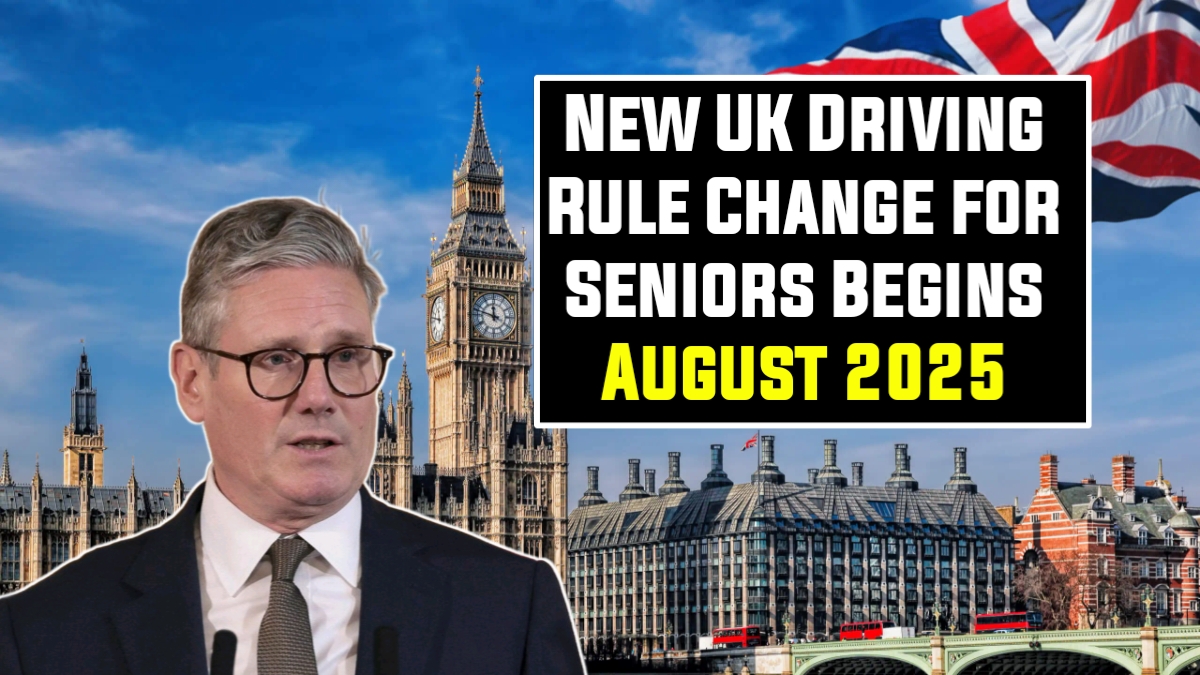From August 1, 2025, UK driving laws will introduce a major change for senior motorists: drivers aged 70 and over will be required to undergo a mandatory medical assessment when renewing their licence. Until now, older drivers only needed to self-declare their fitness to drive, but the new rule aims to improve road safety by ensuring professional checks on eyesight, health conditions, and overall driving ability. With road casualties involving senior drivers rising in recent years, this reform represents one of the most significant updates to driver licensing regulations in decades, balancing safety with mobility.
What is the New UK Driving Rule Change for Seniors?
Currently, UK drivers aged over 70 must renew their driving licences every three years, but only need to self-declare their fitness to drive. Optional medical reports are required only if a health issue is known or flagged by the DVLA. The new rule transforms this process by:
- Requiring a formal medical assessment, likely from a GP, as part of the licence renewal.
- Reducing reliance on self-reporting and introducing professional evaluations to ensure safety.
This shift reassures the public that older drivers are meeting health standards, while promoting safer roads.
Scope and Implementation
- Effective Date: August 1, 2025
- Affected Group: All UK drivers aged 70 and over during licence renewal.
- Applies nationwide across the UK.
This measure is already part of broader road safety reforms under consideration, including mandatory eye tests every three years, potential medical checks for dementia or other impairments, and stricter enforcement on seatbelt, drink- and drug-driving, and uninsured driving.
What Drivers Need to Do
To renew their licences from August 2025 onwards, senior drivers should:
- Arrange a medical assessment with their GP or an authorized medical professional before submitting their renewal application.
- Gather relevant documentation—include the medical certificate alongside the renewal form.
- Submit renewal application as usual, now with medical clearance attached.
The DVLA may also introduce randomized medical screenings—even for drivers without reported issues—to ensure comprehensive safety checks.
Potential Outcomes for Drivers
- If Fit to Drive: License renewed as usual, possibly with a new three-year validity.
- If Not Medically Fit: Renewal may be delayed or refused, and in some cases a driving ban may be imposed.
- Conditional Licences: Some drivers with minor impairments may receive licences with restrictions, such as daytime-only driving.
This approach ensures a safety-first policy, while still respecting the independence of older drivers where possible.
Why It’s Being Introduced
Several factors are driving this policy:
- Rising road casualties among older drivers: Serious or fatal accidents involving those aged 60+ have surged by 47% since 2010.
- Lax self-reporting standards: The UK is one of only three European nations lacking mandatory vision or medical checks for elderly drivers.
- Growing fatalities: In the last year, road deaths rose to 1,633 and serious injuries neared 28,000—a worrisome resurgence after years of decline.
- Comprehensive safety reforms: The new rules are part of the most sweeping road safety package since the 2006 Road Safety Act, aiming to enhance enforcement, reduce accidents, and reinforce safe driving standards.
Final Thoughts
The introduction of mandatory medical checks for drivers aged 70 and above signifies an important shift in UK road safety policy. It underscores the government’s commitment to protecting all road users—balanced against preserving older drivers’ independence. While potentially disruptive, these changes come with the promise of safer roads and more reliable assessments of driver fitness.
FAQs
Q1. What exactly is changing for drivers aged 70 and over?
From 1 August 2025, drivers aged 70 and above will need to complete a mandatory medical assessment when renewing their licence. This replaces the current system where older drivers only self-declare their fitness to drive.
Q2. What will the medical assessment involve?
The assessment is expected to be carried out by a GP or qualified medical professional. It will include checks on eyesight, health conditions, medication use, and overall ability to drive safely.
Q3. What happens if a driver fails the medical assessment?
If a driver does not meet the required health standards, the DVLA may refuse to renew their licence. In some cases, a short-term licence (for one or two years) might be issued, allowing the driver to continue while their condition is monitored.
